Artist calls for apology for treatment of unmarried mothers
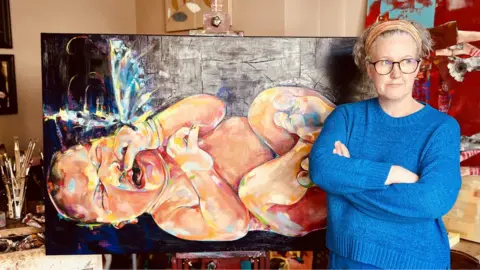 Sara Jane Boyle
Sara Jane BoyleAn artist who was born in a mother and baby home is calling for the government to apologise over the historical treatment of unmarried mothers.
Sara Jane Boyle was born in a home run by nuns in Sheffield and her mother was encouraged to give her up for adoption.
She has launched an exhibition of her work in Loughborough, Leicestershire, reflecting on her experiences.
The government has said it has deep sympathy for affected families.
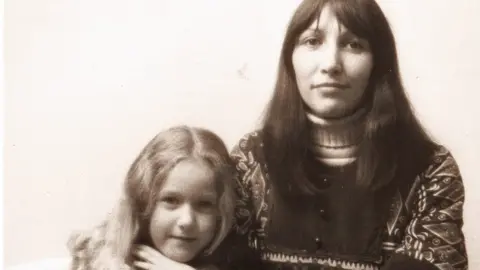 Sara Jane Boyle
Sara Jane BoyleMs Boyle said she hoped that, as well as exploring her family's traumatic experiences of the care system, the exhibition - named What Has Love Got To Do With It - would also shine a spotlight on the issue of forced adoption and the treatment of unmarried mothers.
She said: "I was born in 1971 in St Agatha's, a mother and baby home run by nuns in Sheffield.
"My mother was sent there and was 'encouraged' to give me up for adoption, which she later refused to do.
"Consequently, I was put into foster care until she was able to keep me.
"It's really sad. There are so many mothers who have passed away and lived all their lives with the shame that was so unjustifiably put upon them."
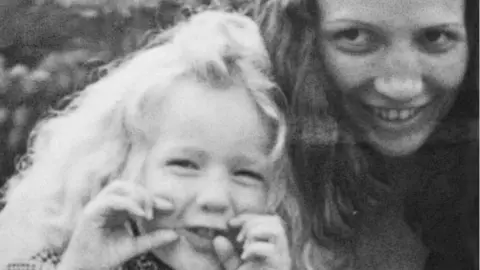 Sara Jane Boyle
Sara Jane BoyleMs Boyle's mother, Mary Ogden, was 20 when she gave birth to her daughter.
Because she had also grown up in care, having been sent to an orphanage at the age of two, Ms Boyle said she was forced to prove she was capable of caring for her daughter.
"She spent her childhood going in and out of children's homes in Duffield and Allestree, around Derby, finally leaving the care system at 18," she said.
"She worked as a nanny and the woman whose children she looked after helped her get me back."
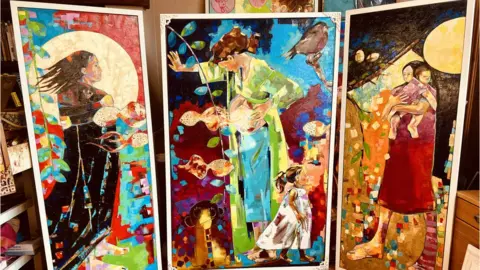 Sara Jane Boyle's work
Sara Jane Boyle's workMs Boyle was returned to her mum at the age of three and grew up with her in a council flat in Sawley.
"My mother died at the age of 67 and I know our past weighed heavily on her; she felt guilt for taking me back, believing I might have had a better life," she said.
"However, I passionately believe there should be no shame attached to mothers who have had their babies taken off them and I am sharing my art to spread awareness of such historical wrongs.
"I'm wearing my heart on my sleeve more than ever before and as an artist I feel this is only the beginning of my journey."
The exhibition features 25 works, including oil paintings, sketches and prints, and runs at the Sock Gallery until 3 June.
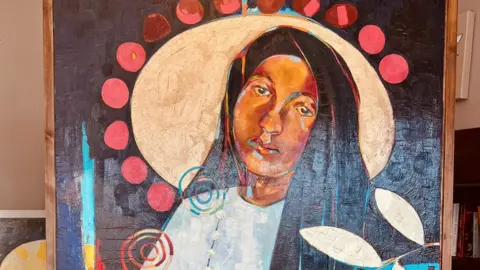 Sara Jane Boyle
Sara Jane BoyleMs Boyle said the trauma of her upbringing had left her with selective mutism in her early childhood - an anxiety disorder that leaves someone unable to communicate in certain situations.
"Because words were so hard to find I tried to imagine other ways to creatively express myself and so began my long relationship with the arts," she said.
"This exhibition is daunting for me because of the personal depth to it.
"I am beginning to unravel the ties which have bound me to my past but I am also shining the spotlight on an important social issue which has deeply affected my family."
In July, an inquiry by the Joint Committee on Human Rights called for women who were forced to give up their children to receive a government apology.
"While some governments have formally apologised for the historical treatment of unmarried mothers in homes, ours is yet to do this," Ms Boyle said.
"It's more about the awareness and the aftermath of what this treatment meant.
"The government needs to take ownership of the fact that there were mistakes made and that, even today, there are adoptees who are unaware they were given away unwillingly."
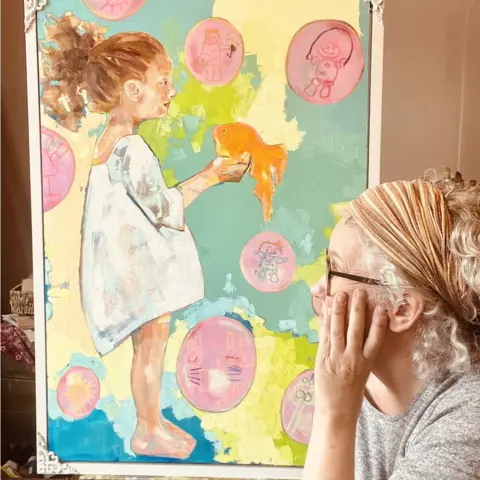 Sara Jane Boyle
Sara Jane BoyleThe government has previously said: "We have the deepest sympathy to all those affected by historic forced adoption.
"While we cannot undo the past, we have strengthened our legislation and practice to be built on empathy, from NHS maternity services caring for vulnerable women and babies, to our work transforming the adoption process and care system to help children settle into stable homes."
If you have been affected by any of the issues in this article, you can find details of organisations that can help via the BBC Action Line.

Follow BBC East Midlands on Facebook, on Twitter, or on Instagram. Send your story ideas to [email protected].
